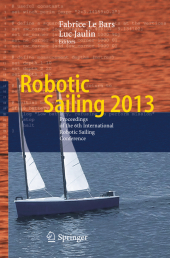 Neuerscheinungen 2013Stand: 2020-01-07 |
Schnellsuche
ISBN/Stichwort/Autor
|
Herderstraße 10
10625 Berlin
Tel.: 030 315 714 16
Fax 030 315 714 14
info@buchspektrum.de |

Fabrice Le Bars, Luc Jaulin
(Beteiligte)
Robotic Sailing 2013
Proceedings of the 6th International Robotic Sailing Conference
Herausgegeben von Bars, Fabrice Le; Jaulin, Luc
2014. 2013. xiii, 149 S. 21 SW-Abb., 41 Farbabb.,. 235 mm
Verlag/Jahr: SPRINGER, BERLIN; SPRINGER INTERNATIONAL PUBLISHING 2013
ISBN: 3-319-02275-X (331902275X)
Neue ISBN: 978-3-319-02275-8 (9783319022758)
Preis und Lieferzeit: Bitte klicken
With contributions from leading experts in the field of robotic sailing, this volume of papers from the sixth International Robotic Sailing Conference covers the current and future academic and technology challenges in developing autonomous sailboat robots.
An autonomous sailboat robot is a boat that only uses the wind on its sail as propelling force, without remote control or human assistance to achieve its mission. This involves autonomy in energy (using batteries, solar panels, turbines...), sensor data processing (compass, GPS, wind sensor...), actuators control (rudder and sail angle control...) and decision making (embedded computer with adequate algorithms). Although robotic sailing is a relatively new field of research, several applications exist for this type of robots: oceanographic and hydrographic research, maritime environment monitoring, meteorology, harbor safety, assistance and rescue in dangerous areas...
Over the last decade, several events such as the Microtransat challenge, the WRSC/IRSC and SailBot have been set up to stimulate research and development around robotic sailing. These proceedings cover the current and future academic and technology challenges raised by the development of autonomous sailboat robots presented at the WRSC/IRSC (World Robotic Sailing Championship/International Robotic Sailing Conference) 2013, in Brest, France, 2-6 September 2013.
Part I Hardware design.- Part II Energy and power management strategies.- Part III Modeling, simulation, control, and stability analysis.- Part IV High level control architectures and algorithms.


